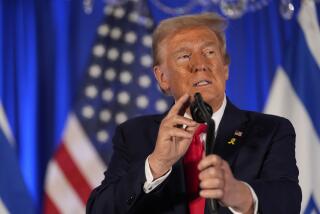Reagan Appeals to Gorbachev to Free Reporter
- Share via
WASHINGTON — President Reagan sent a private appeal last week to Soviet leader Mikhail S. Gorbachev asking for the release of jailed American reporter Nicholas Daniloff, the White House said Saturday.
And in an unusual move, Reagan offered Gorbachev his personal guarantee that the U.S. News & World Report correspondent is not a spy, a White House official said, speaking on condition that he not be identified.
“The message urged Daniloff’s release and made it clear that his detention could damage U.S.-Soviet relations,” a spokeswoman for U.S. News & World Report, Kathy Bushkin, said in a report identical to that of the White House official. “Reagan also vouched for Daniloff, making it clear he was not a U.S. spy.”
Normally, the U.S. government refuses to confirm or deny any charges of American espionage. Officials say denying false spying charges would lead to a situation where foreign governments could take the absence of a definitive denial as a tacit confirmation. But Reagan apparently decided to make an exception in Daniloff’s case.
Gorbachev has not responded to the message, the White House said.
Eight KGB officers arrested Daniloff, 52, last Saturday when he met a Soviet acquaintance in a Moscow park. The acquaintance had given Daniloff a package that Soviet officials charge contained secret documents.
Reagan’s message, which was sent to Moscow from the President’s ranch near Santa Barbara on Thursday, was his first known personal action on Daniloff’s behalf.
White House aides said Reagan has deliberately avoided making a public statement on the issue in hopes that a low-key approach might lead to Daniloff’s early release.
Escalating Pressure
Bushkin said that under the White House timetable, the President’s message would be made public this week.
That will represent a continuing escalation of public pressure by the Administration for Daniloff’s release. On Friday, Secretary of State George P. Shultz and Secretary of Defense Caspar W. Weinberger publicly condemned the Soviets’ action, the first such high-level statements. State Department officials said several other measures are under consideration, including the cancellation of cultural and academic exchange events while Daniloff remains in Lefortovo Prison.
Bushkin said U.S. News Editor David Gergen, former White House communications director, had asked the White House to consider the idea of a personal message from Reagan to Gorbachev, but he had not specifically suggested that the President vouch that Daniloff was not a spy.
“It was his (Reagan’s) idea, and we all applauded,” a White House aide told the magazine.
Colleagues Pleased
U.S. News Chairman and Editor in Chief Mortimer B. Zuckerman joined Gergen in a joint statement saying they were “enormously grateful” for Reagan’s action.
“By sending a message to Mr. Gorbachev, the President has committed his personal authority to the cause and innocence of Nicholas Daniloff,” the statement said. “This act should persuade Soviet leaders to release him.
“The Soviets are now on the clearest possible notice that Nick is not a spy,” they added.
White House officials quoted by U.S. News said there was a precedent for Reagan’s action in a case in 1963, when then-President John F. Kennedy sought the release of a Yale University professor arrested by the KGB.
Kennedy sent a personal message to Soviet leader Nikita S. Khrushchev saying that the scholar, Frederick Baarghorn, was not a spy. Baarghorn was freed shortly thereafter, and Soviet officials said Kennedy’s personal intervention had been a key factor.
Times staff writer James Gerstenzang contributed to this story from Santa Barbara.
More to Read
Sign up for Essential California
The most important California stories and recommendations in your inbox every morning.
You may occasionally receive promotional content from the Los Angeles Times.














